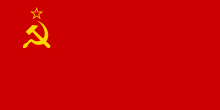
The Unified Team was the name used for the sports team of the former Soviet Union (except the Baltic states) at the 1992 Winter Olympics in Albertville and the 1992 Summer Olympics in Barcelona. The IOC country code was EUN, after the French name, Équipe unifiée. The Unified Team was sometimes informally called the CIS Team, although Georgia did not join the CIS until 1993.

The 1980 Summer Paralympics, branded as the Olympics for the Disabled, were the sixth Summer Paralympic Games. They were held in Arnhem, Netherlands, from June 21 to 30, 1980.

The 1992 Summer Paralympics were the ninth Paralympic Games to be held. They were held in Barcelona, Spain. In addition, the 1992 Paralympic Games for Persons with mental handicap were held immediately after the regular Paralympics in the Spanish capital, Madrid.
The 1988 Winter Olympics, officially known as the XV Olympic Winter Games, was a winter multi-sport event held in Calgary, Canada, from 13 to 28 February 1988. A total of 1,423 athletes representing 57 National Olympic Committees (NOCs) participated in 46 events from 10 different sports and disciplines. Five new events were contested at these Games—men's and women's Super G in alpine skiing, team events in Nordic combined and ski jumping, and women's 5000 metres in speed skating—and two events returned to the program—men's and women's combined in alpine skiing.

The Soviet Union first participated at the Olympic Games in 1952, and competed at the Games on 18 occasions subsequently. At six of its nine appearances at the Summer Olympic Games, the Soviet team ranked first in the total number of gold medals won, it was second by this count on the other three. Similarly, the team was ranked first in the gold medal count seven times and second twice in nine appearances at the Winter Olympic Games. Soviet Union's success might be attributed to a heavy state's investment in sports to fulfil its political agenda on an international stage.

Volleyball has been part of the Summer Olympics program for both men and women consistently since 1964.

Basketball at the Summer Olympics has been a sport for men consistently since 1936. Prior to its inclusion as a medal sport, basketball was held as a demonstration event in 1904. Women's basketball made its debut in the Summer Olympics in 1976.

Azerbaijan first participated at the Olympic Games as an independent nation in 1996, and has sent athletes to compete in every Games since then.

Latvia first participated at the Olympic Games in 1924. After the nation was occupied by the Soviet Union in 1940, Latvian athletes competed for the Soviet Union at the Olympics between 1952 and 1988. After the independence of Latvia and the dissolution of the Soviet Union in 1991, the nation returned to the Olympic Games in 1992 and has competed at every Games since then.

Tajikistan first participated at the Olympic Games as an independent nation in 1996, and has sent athletes to compete in every Summer Olympic Games since then. The nation has also competed at the Winter Olympics since 2002. To date, Andrei Drygin is the only person ever to have represented Tajikistan at the Winter Olympic Games, being his country's sole competitor in 2002, 2006, and 2010.

An all-time medal table for all Paralympic Games from 1960 to 2018 Winter Paralympic Games ant publish all-time tables, and publishes unofficial tables only per single Games. This table was thus compiled by adding up single entries from the IPC database.

The Union of Soviet Socialist Republics made its Winter Paralympic début at the 1988 Winter Paralympics in Innsbruck, Austria. This was also the last appearance of the Soviet Union in the Winter Paralympics before the union's dissolution. The country was represented by eight athletes, who all completed in cross-country skiing. Valentina Grigoryeva won the USSR's only medals: two bronze.
Sergey Sevostianov,, sometimes Sergei Sevastianov, is a blind Paralympian athlete from Russia competing in pentathlon and jumping events

Denmark made its Paralympic Games début at the 1968 Summer Paralympics in Tel Aviv with a delegation of eight competitors, in swimming and table tennis. The country has participated in every subsequent edition of the Summer Paralympics, and in every edition of the Winter Games since 1980.

Latvia, following its independence from the Soviet Union, made its Paralympic Games début at the 1992 Summer Paralympics in Barcelona, with a delegation of two athletes in track and field. It then sent Supulnieks as its sole representative to the 1994 Winter Paralympics, for its Winter Games début. Latvia has taken part in every subsequent edition of the Summer Paralympics, but missed the 1998 and 2002 Winter Games, appearing with a one-man delegation in 2006, before being absent again in 2010.

Ukraine made its Paralympic Games début at the 1996 Summer Paralympics in Atlanta, with thirty athletes competing in archery, track and field, powerlifting, swimming, and sitting volleyball. Vasyl Lishchynskyy won Ukraine's first Paralympic gold medal, in the shot put, and Ukrainians also won four silver medals and two bronze. Ukrainians had previously participated within the Soviet Union's delegation in 1988, and as part of the Unified Team in 1992. Ukraine, following its independence from the Soviet Union, missed out on the 1994 Winter Games, but made its Winter Paralympics début at the 1998 Winter Games in Nagano. Ukraine has competed at every edition of the Summer and Winter Games since then and have done so with remarkable success.

Rima Batalova, is a Paralympian athlete from Russia competing mainly in category T12 middle distance events.















